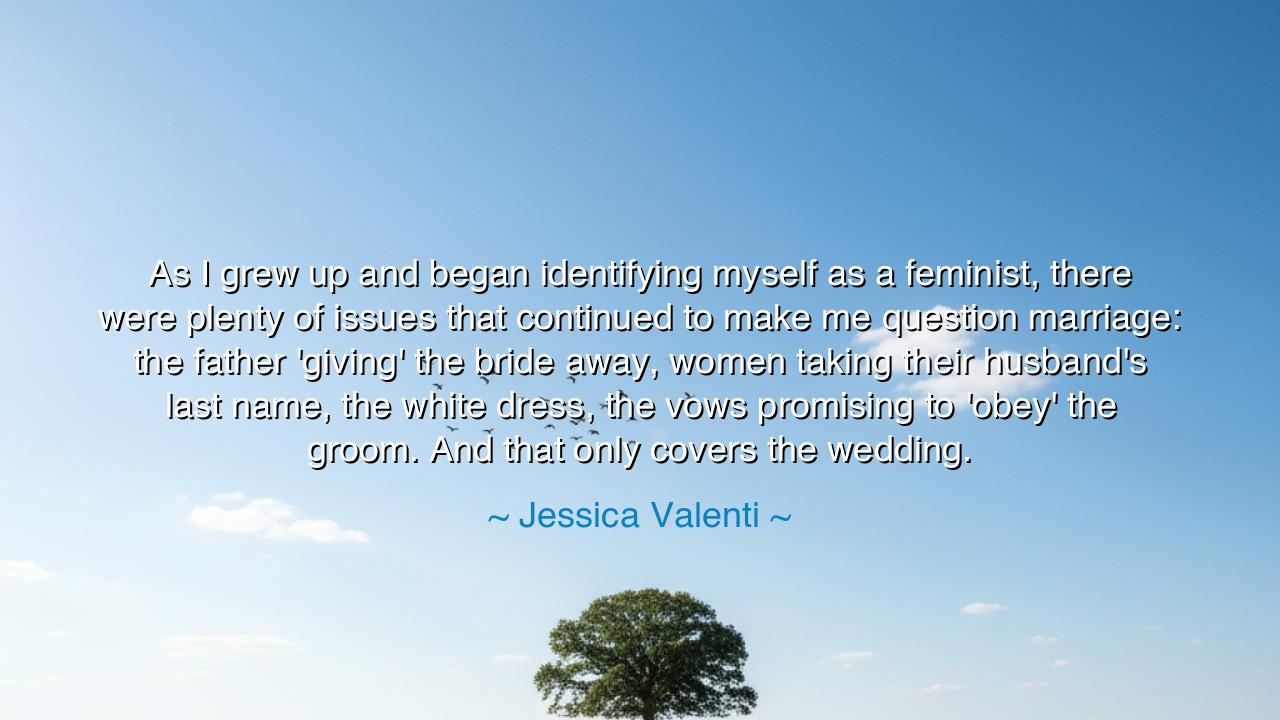
As I grew up and began identifying myself as a feminist, there
As I grew up and began identifying myself as a feminist, there were plenty of issues that continued to make me question marriage: the father 'giving' the bride away, women taking their husband's last name, the white dress, the vows promising to 'obey' the groom. And that only covers the wedding.






In this reflection, Jessica Valenti speaks with boldness about the deep-rooted patriarchal traditions embedded in the institution of marriage and, more specifically, in its rituals. As she came of age and embraced her identity as a feminist, she began to question the symbols and practices that many accept without thought. From the father “giving” the bride away to the vows of obedience, from women taking their husband's last name to the symbolic white dress, each element carries centuries of history — history often built upon the subjugation of women. Her words reveal the tension between personal love and societal expectation, between individual desire and collective tradition.
The image of a father “giving” his daughter away comes from a time when marriage was an exchange of property. In many ancient cultures, a bride was literally considered her father’s possession, passed to her husband along with dowries or political alliances. Though today the gesture may be seen as symbolic and affectionate, its origins remind us of a world where women lacked agency over their own lives. Jessica’s discomfort with this tradition stems from her desire to see marriage as a union of equals, not a transaction masked in ceremonial beauty.
Similarly, the practice of taking the husband’s last name echoes ancient laws like coverture, under which a woman’s legal identity was absorbed entirely into her husband’s upon marriage. In medieval England, a wife could not own property, sign contracts, or act independently — she existed legally only through her husband. To Jessica, this tradition is not a harmless formality but a lingering echo of systemic inequality, a reminder that marriage has historically been used to erase women’s individuality rather than celebrate it.
The white wedding dress, now synonymous with purity and romance, also carries layered meaning. Popularized by Queen Victoria in the 19th century, white became a symbol of innocence and virtue, placing unrealistic expectations upon women while leaving men free from such scrutiny. Even the vows promising to “obey” the groom reflect an older world order, where hierarchy was enshrined in love’s most sacred promises. By pointing out these elements, Jessica challenges us to ask whether we are truly celebrating love, or merely repeating rituals whose origins no longer serve our ideals.
Her critique resonates with history’s moments of rebellion. In the early 20th century, suffragists and reformers began to question these same practices. Women like Elizabeth Cady Stanton refused to include the word “obey” in their vows, boldly defying social norms. These acts were more than personal choices — they were declarations of resistance, planting seeds for future generations to rethink what marriage could mean. Jessica’s words continue this legacy, calling on us to examine the past so that we may reshape the future.
Thus, this quote becomes a teaching for all who seek love and equality. A wedding should not be a prison of tradition but a celebration of mutual respect and partnership. By questioning the symbols that surround marriage, we reclaim its true essence: two souls joining freely, with neither given away, erased, nor commanded. Only when love stands on the foundation of equality can the rituals that surround it truly honor the sacred union they are meant to represent.






AAdministratorAdministrator
Welcome, honored guests. Please leave a comment, we will respond soon